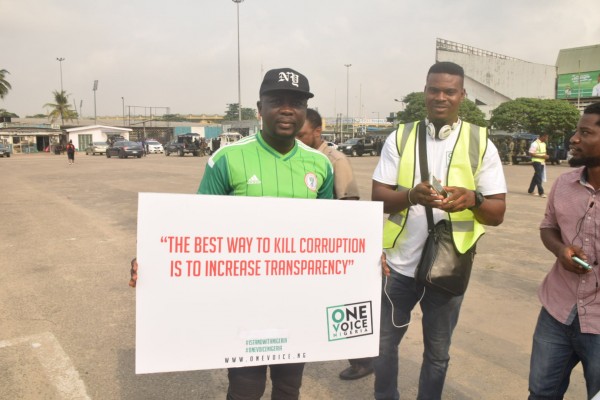Hundreds of Nigerians called for a change of government on Monday as they marched through the streets of Lagos, reflecting mounting public anger over a sputtering economy and political tensions blamed on an absentee president.
In a rare show of public dissent against the administration of President Muhammadu Buhari, more than 500 demonstrators halted traffic in the commercial capital, flanked by a heavy police escort as a truck blasted out protest songs.
Buhari has been in Britain since mid-January for treatment for an unspecified medical condition and, with no indication of when he might return, many Nigerians suspect his health is worse than officials admit.
The country is also mired in its first recession in 25 years and high inflation is driving up prices of basic goods.
"Unemployed people are hungry and angry," read one Lagos demonstrator's sign, against a backbeat of anthems by Afrobeat superstar Fela Kuti, a fearless critic of Nigeria's often brutal and corrupt military rule until his death in 1997.
"Government of the rich, for the rich, making rules for the poor," chanted other protesters.
Buhari, whose age is officially given as 74, took office in 2015 on pledges to diversify the economy away from oil, fight corruption and end an Islamic insurgency by Boko Haram that broke out in the northeast in 2009.
But critics say he has made little progress, with Nigeria still heavily dependent on crude exports whose price has halved since 2014.
The still active insurgency has killed more than 15,000 people and led to a humanitarian crisis has left 1.8 million Nigerians at risk of starvation and turned millions more into refugees.
With Buhari's hold on power looking increasingly uncertain, some fear a rerun of the unstable three-month transition triggered when President Yar'Adua died, before his vice president Goodluck Jonathan was sworn in in 2010.
Like Yar'Adua, Buhari is a Muslim from the north, and like Jonathan, the current president's deputy Yemi Osinbajo is a southern Christian.
Traditionally the two religious groups have taken turns to hold the presidency, but that accord was unbalanced by the death of Yar'Adua before his first four-year term ended. Olusegun Obasanjo, his Christian predecessor, held office for the maximum eight years, while Jonathan was in power for five.
Ethnically-charged violence has swept Nigeria's heartland, where hundreds have died in clashes between Muslim herders and mainly Christian farmers, and militants continue to operate in the oil-rich Delta region in the southeast.
© Reuters News










0 comments:
Post a Comment